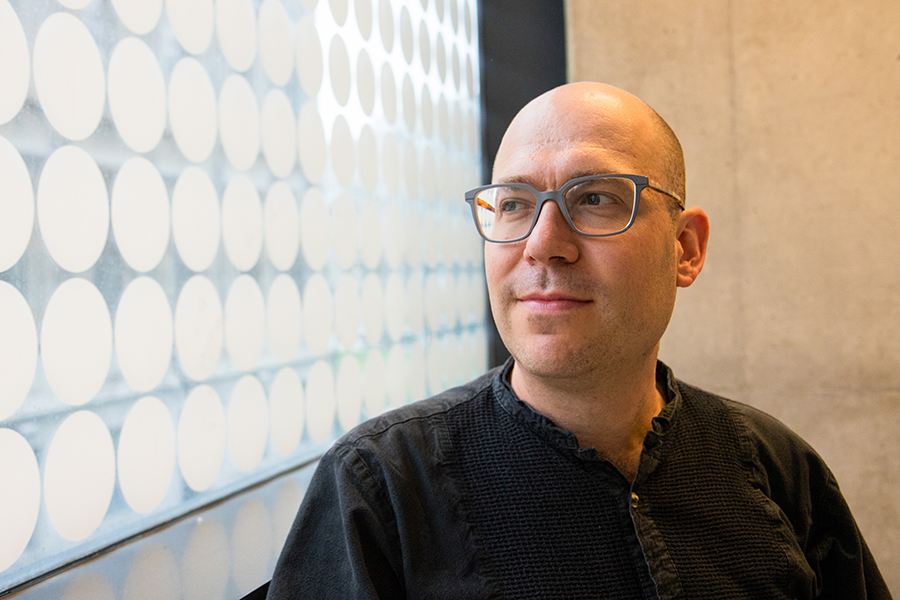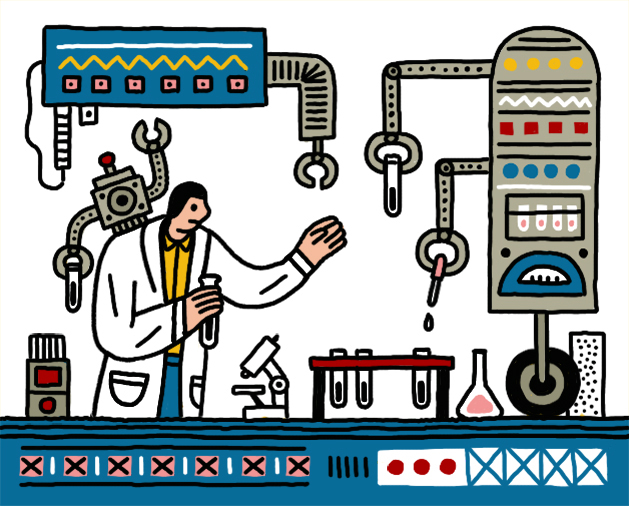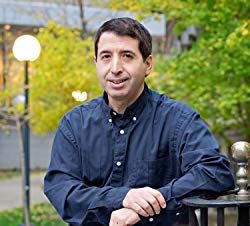It’s hardly a secret that artificial intelligence is changing our world. Just tune into a newscast and you’ll hear story after story about self-driving cars, facial-recognition software, Go-playing computers, and much more. But for Alán Aspuru-Guzik, a professor of chemistry and computer science at U of T, the real potential of AI goes far beyond any one specialized application. Rather, he believes that AI is poised to change the very way we do science.
Much of his work has focused on chemistry and materials science. Developing new materials has always been a painstakingly slow process – at least when done by humans. But an AI system, employing what computer scientists call machine learning algorithms, can try one combination of molecules after another, millions of times if necessary, until something clicks. Such systems hold the promise of vastly accelerating the process of discovery.
“A robot doesn’t have feelings – at least, not yet,” Aspuru-Guzik says half-jokingly as we sit in his fourth-floor office in the Lash Miller Chemistry Building. “A human isn’t willing to give up two or three hours of their life, pipetting and doing experiments” unless there’s a reasonably good chance of getting a positive result, he says. But a machine will happily rise to the occasion, no questions asked. And each experiment builds on what’s been done previously. “Based on the experiments you’ve done so far, [the system] often predicts what the best experiment is to do next.” This level of automation means that humans have to “give up the driver’s seat” to a computer, which may seem humbling at first, but it also gives the human scientists time to “work on more important things,” such as thinking about the kind of research projects to pursue in the first place. Aspuru-Guzik’s laboratory, just down the hall in Lash Miller, is poised to become what he calls a “self-driving lab.” In such an environment, a human sets up the first experiment and then leaves the system to chug away on its own; the scientist is free to work on other projects while the machines handle the grunt-work of experimental chemistry.
A similar kind of automated process has already led to provocative advances in drug discovery. Drugs typically involve complex molecules, and there are as many possible molecules as there are arrangements of atoms that can bond to each other – in other words, an astronomical number. (In his presentations, Aspuru-Guzik often compares these mind-numbingly large sums to the number of atoms in the visible universe, which is about 1080, or a 1 followed by 80 zeros.) But an AI system isn’t daunted by issues of complexity or size. It may not be able to comb through 1080 molecules, but, given a database of thousands of existing molecules and their properties, the system can speedily guess the properties of related, untried compounds. Of course, someone has to create the AI in the first place, and Aspuru-Guzik’s team focuses on developing and honing these algorithms, and tailoring them to specific tasks.
Last fall, Aspuru-Guzik, together with colleagues, co-authored a paper in Nature Biotechnology reporting on an AI system that, in just a few weeks, identified a compound (known in biotech as a kinase inhibitor) that could potentially be useful in treating muscular dystrophy. As Aspuru-Guzik is quick to admit, finding a promising molecule is only the first step toward developing a drug that can actually be used to treat human diseases; that process can take many years and cost billions of dollars. Still, it’s at least suggestive of the power of AI in identifying new chemical compounds, some of which will likely find a place in medical treatments. (Aspuru-Guzik notes that he served as an external consultant on the kinase inhibitor project, but he expects to have “more hands-on involvement” in future work with the team.) Meanwhile, he believes that AI holds the promise of greatly speeding up each stage in the drug development process, and perhaps even improving the efficiency of clinical trials.
Aspuru-Guzik is currently collaborating with Jason Hein, a chemist at the University of British Columbia, and with pharmaceutical giant Merck, on further drug research. But the world of drugs and medicine is just one piece of a very large puzzle. AI, he believes, has the potential to transform many branches of science. He’s keen on using machine learning to build better semiconductors, batteries, and LEDs from organic compounds, to make them both more efficient and more environmentally friendly. Generally he’s eager to develop new materials for energy production and storage, which he sees as essential for fighting climate change. Hein, the UBC chemist, says Aspuru-Guzik has an “ability to generate excitement and inspire radical research… This combination of creativity, vision and daredevil science defines how big ideas come to fruition.”

Aspuru-Guzik was born in the United States to Mexican parents (his father is an electrical engineer, his mother a psychoanalyst). The family soon moved back to Mexico, where he stayed until college. Then, as now, his two great passions were computers and chemistry. He grew up experimenting with computers, and by the early 1990s was running a popular bulletin board service that allowed people to connect with each other over computer networks, before the Internet was even a thing. He also represented Mexico at the International Chemistry Olympiad when he was in high school, after which his enthusiasm for chemistry continued to grow. He majored in chemistry at the National Autonomous University of Mexico, earned his PhD at Berkeley, and continued his work there as a postdoc, where he turned his attention to quantum computing – a field that was in its relative infancy at the time, he notes, but which has now entered the mainstream. (Today, his two loves, chemistry and computers, are tightly fused. As his website puts it, his lab’s motto is “Revolutionizing chemistry using computer science.”)
Aspuru-Guzik joined the faculty at Harvard in 2006 – a move which, for many academics, would signal that their career had reached its apex. But after more than a decade in the U.S. he became increasingly disturbed by what he saw happening around him: a growing disparity between rich and poor; a denial of basic science by ordinary citizens and by political leaders; political polarization; gun violence; and a lack of concern over what he sees as the greatest existential threat of our time, climate change. Though Aspuru-Guzik seems to default to mild-mannered congeniality, when discussing these subjects he takes a more serious tone.
“The canary in the coal mine was the election of Donald Trump,” he says. “It signalled to me that there’s something really wrong going on in the United States.”
(And he isn’t shy about saying how he feels, adding “I say my political views publicly.”)
He considered a number of options, including moving to another country such as Australia, before deciding on Canada. “I feel lucky that U of T was interested in me, when I reached out,” he says. He joined the university in 2018, is now a Canada 150 Research Chair and the Canada CIFAR AI Chair at the Vector Institute for Artificial Intelligence.
As embedded in academia as he is, Aspuru-Guzik is very much connected to the world outside. He’s founded two startups, one of which, Zapata Computing, has an office in Toronto. The goal with each, he says, is to “put discoveries into practice.”
Aspuru-Guzik is currently applying for permanent resident status in Canada. He and his family – his wife and their two school-age children – instantly took to Toronto. He enjoys the city’s diversity, and appreciates the country’s equitable health care system. And while Canada is a leader in many scientific fields, he believes it needs to push even harder to ensure it stays at the forefront of scientific research. (He notes that Canada no longer has a Minister of Science – a move that he feels ought to be corrected.) Research institutes like Vector are terrific, but he says we ought to be founding one such institute every year on AI-related fields alone. And, above all, he says we have to be on guard to ensure that what’s happening in the U.S., where respect for basic science seems to be dangerously low, does not happen here. “For as long as I’m in Canada, I’m going to be an advocate for investing in science,” he says. “We can’t rest on our laurels. We should never be complacent.”







No Responses to “ Alán Aspuru-Guzik Has Seen the Lab of The Future, and It’s Very, Very Fast ”
Great article. I recently travelled through Australia and New Zealand. I met several young chemists and engineers from around the world. They were working on ways for AI to solve the problems that humans ask of it, but also for ways to have the computers ask the questions that could lead to solutions in medicine, commerce and many other fields.
It is reassuring to know that talented academics from around the world are choosing Canada as an accepting and safe environment to raise a family, and to do the work that will help address the ill-conceived, close-minded decisions of the past. I have been fortunate to travel extensively since I retired. The more I travel, the more I realize how well-respected Canada is around the world -- something most Canadians take for granted.
It will be interesting to see how these discoveries -- those that have true merit, in particular -- are brought to the marketplace to serve the public. For example, the Alberta Research Council has developed, with taxpayer support, viable products from research -- only to see them sold to the U.S. because there was no investor interest in Canada. Working with Merck is appropriate to access resources, but I would be concerned if our tax dollars are contributing to these studies without any future return and recognition.
Thanks for this insightful article. The question that I have asked myself pertains to the way algorithms are employed in AI. Does AI predict future actions of individuals based on their past activities? If so, is it more likely that more or better innovative predictions could be made for those with longer historical activities than those with shorter ones? So if the historical data contained more information about men, the AI's predictions would be more relevant to men?
I'm very proud that Canada has welcomed Prof. Alán Aspuru-Guzik. He will help shape our scientific future and teach many young people to carry the torch of excellence.
How did I not find U of T Magazine before. Really great articles.